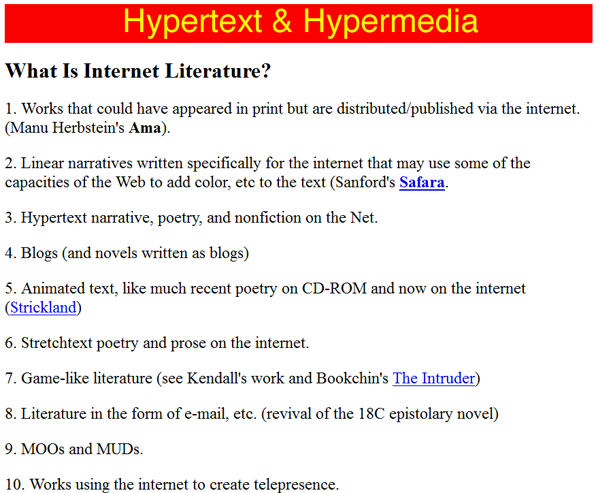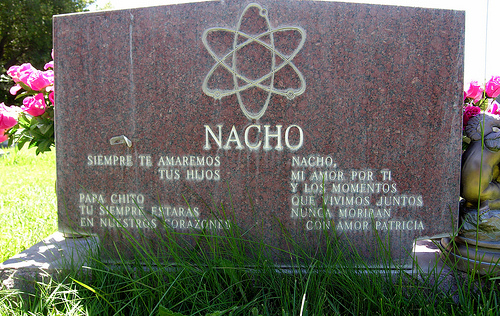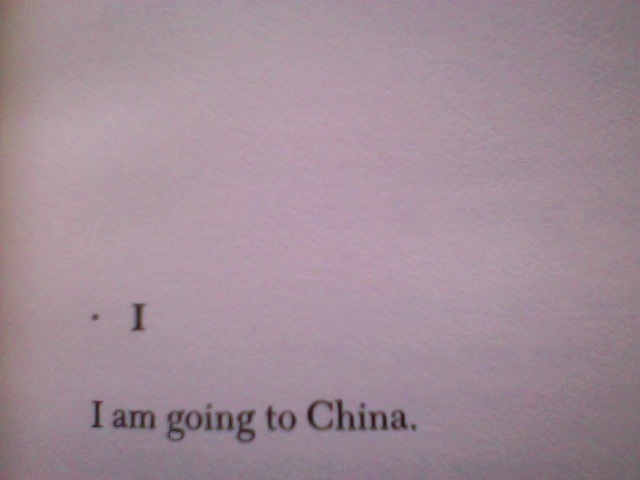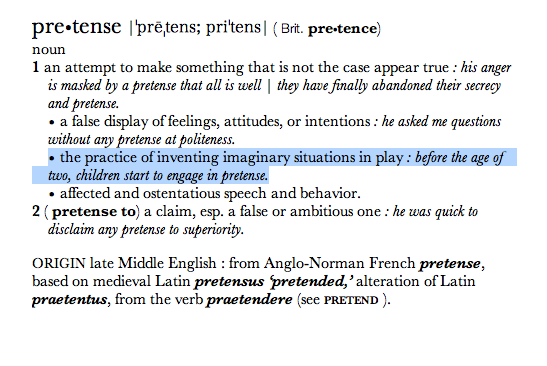Tales of Woe and Toenails
Yes, I am well aware that the first marathon runner dropped dead for his efforts. If he hadn’t, we wouldn’t go 26.2 miles; we’d go some other outrageous distance that killed its first runner.
Every year a few people die running marathons. Of course, every day ridiculous numbers of people die doing absolutely nothing. I choose to run marathons, and I don’t have a death wish, though I will admit I’m drawn to the drama of distance running. You could die. You could fracture bones, tear muscles, lose toenails. You will definitely suffer, a lot. Cool.
That said, it’s odd to talk about the drama of running because here’s another thing I’ll admit: running is boring. A fellow running buddy of mine once joked that no one has ever sat through the entirety of Chariots of Fire and remained conscious. And this is coming from someone who loves running more than he loves his wife and kids. I’ve never seen Chariots of Fire—in fact, I haven’t seen any movies about runners, and I don’t feel any particular compulsion to do so, despite the fact that my colleagues keep shouting “Prefontaine!” and “Run, Fatboy, Run!” when they see me at work. (People love it when they think they have you figured out; because I run marathons, they’ve decided that every aspect of my life no doubt revolves around running. It could be worse; there was that one year everyone thought I was into cows. Let’s just say I had a very Holstein Christmas.)
Damien Hirst on Writing
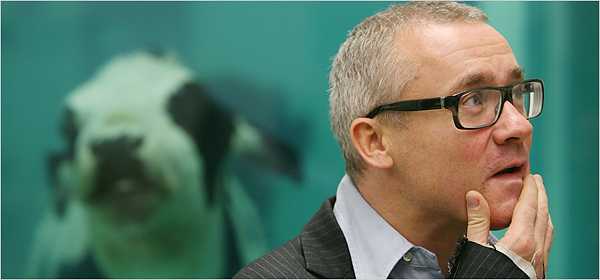
“Every day your relationship with death changes.”
“You’ve got to be oblivious to other people-the push and pull of other people’s opinions, the way other people measure success. It’s then that you realize you are 100 percent who you are and you have to use that who-you-are 100 percent in order to create great things. And that’s very difficult because everyone wants to be better than they are. You’ve really got to get down on the floor with yourself and get low in order to make great art. I think you’ve just got to accept who you are and do the most unbelievable things.”
“I sometimes feel that I have nothing to say and I want to communicate this.”
“Artists are like everybody else.”
“And I think, you know, I like it, so I can’t understand it, I think if you’re gonna have this stuff going in your ears, you might as well have some stuff going in your eyes.”
“I wanted a shark that’s big enough to eat you, and in a large enough amount of liquid so that you could imagine you were in there with it.”
“There’s always something you missed or something you didn’t notice or somehow you got wrong… I don’t really have a beginning.”
“Architects don’t build their own houses.”
“I always feel like the art’s there and I just see it, so it’s not really a lot of work.”
“I’m more interested in why people are frightened by Jaws and why Jaws was such a hit than saying Spielberg’s my main influence.”
“Sometimes when you’re drunk you can see better.”
“I always liked the fact that you get these totally unacceptable images, but they’re taken by a really expensive photographer, with great light, and in terms of the quality of the photograph it’s a great photograph, but in terms of imagery it’s unacceptable, and I like that contradiction.”
“People say to me that my work’s sensational. And I go, “What’s wrong with sensation? It’s like touching skin.” Sensation is an element of what I do, and why not? It’s not sensational for the sake of being sensational, but it’s sensational art.”
“I don’t think I invented anything. It’s like I just saw it, just because I did it first. The road was there. It was going to happen.”
“It’s good to have a title that’s not just one word. If you’re gonna title it, you might as well try and say something.”
“There’s no possible way you can get what you want.”
“The great thing about painting now is that I’ve gotten to the point where I can forget everything just by doing it. And I never used to be able to do that.”
“I just wanted to find out where the boundaries were. I’ve found out there aren’t any. I wanted to be stopped but no one will stop me.”
“I don’t mind if it falls over… if you break the glass you replace the glass, if the sheep falls out you can always get a new sheep.”
“Warhol said a brilliant thing. He said if anybody slags anything off, make more.”
“The World Doesn’t Smell Like You,” from LOOK! LOOK! Feathers by Mike Young

This post, part of a series of short reactions to the stories from Mike Young’s really remarkable collection LOOK! LOOK! FEATHERS was written by Gabe Durham, who picked the story for Keyhole #10.—MS
“The World Doesn’t Smell Like You,” from Mike Young’s story collection LOOK! LOOK! FEATHERS, is a quest narrative about these high school dumbasses who need to know whether the rumor’s true that their gym teacher, Coach Schiel, has only got one ball.
It’s one of the L!L!F stories I got to read an early draft of, it’s the story I got to publish in Keyhole 10, and when in a certain mood, it’s my favorite story in the collection. Other favorites are “Susan White,” “Snow You Know,” “The Same Heart,” and “Burk’s Nub,” the latter a band-nerd companion to “The World” that underscores each high school clique’s unique potential for cruelty. READ MORE >
memoir bully, memoir befriend!
On memoir, Fran Lebowitz says that if your life were all that interesting, someone else would write a book about it.
In basic agreement, Lorrie Moore replies to Lebowitz:
And, among several gleaming shreds, this analogy of the memoir to:
Are you coming into the house of narrative through the back door because the back door is where the money is?
or…
People are telling us their personal stories and speaking to us of their private lives and even if the structure is rickety and the prose has, to borrow Dick Cavett’s phrase, “all the sparkle of a second mortgage,” we are going to hang in there because it is true.
You can already see Moore’s reluctant (real at all–I dunno) respect (attack?) of/for the form. A funny thing NYRB chose her to review memoirs, but possibly they knew exactly what they were doing. Dinty Moore responds to Moore:
I remember seeing the words: “now you are the fastest piglet in the county.”
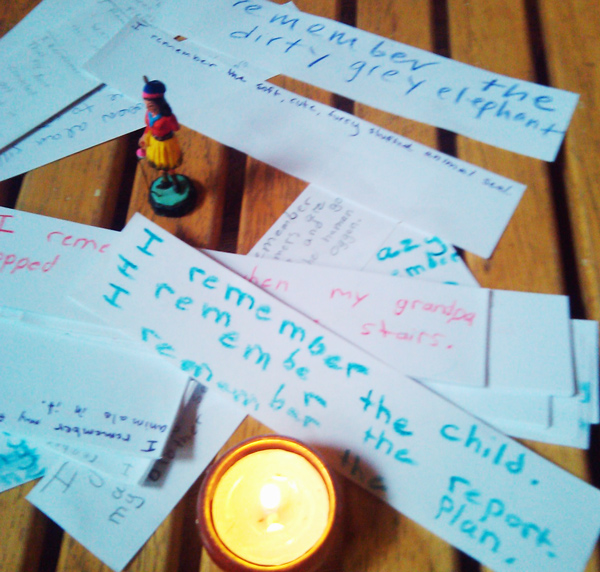
Bhanu Kapil writes “I remembers” with fourth graders. These children are brilliant. Magic. Geniuses.
I remember when I would write poetry in elementary school. Every couple months our class would have a showcase. Our parents would come. We would display our talents. I would always read an original poem. They were often about seasons and candy (what else is new)…and the relationship between seasons and candy (candy corn–so autumn). I was proud that I didn’t have to use a rhyming dictionary to write my poems and the kids would say, “One day you’ll be a famous poet. One day you’ll have a huge book of poems!” One time I tried to do a piano recital but got nervous and fucked up. So I thought, I should stick with the poems. And I’ve stuck with words all this time.
Highlights from Bhanu’s trip to Garfield Elementary School: I Remember: [1]
READ MORE >
Tao Lin on the Future of the Novel
At the Observer, Tao Lin considers the future of the novel.
“I feel less pressured to consider, engage with or respond to the development or advancement of the novel than to undistractedly view each possible novel as uniquely occupying an area on something spherical (like how humans on a round Earth don’t feel able to “advance” by walking in the correct direction, unlike they would in a side-scrolling video game or flat world, unless they’ve self-defined a goal like to live in Manhattan, but are required to be “productive” in other ways), where, though, as conscious beings with urges created by evolution, the default mode of perception is to distort it into a line, to discern an illusion of progress or direction.”
What do you think.
On Pretense, Piss Christ & Pizza
— Susan Sontag, “Project for a Trip to China”
So I would start out with the dictionary definition of pretense, which would be useful actually, because I feel that many people do not know it, but that would be perceived as pretentious; but then I’ve already made the presumption that many don’t know the meaning of pretense, and thus pretentious and so; in fact, the whole premise of this is totally. An obscure quote? Semi-colons? What an ass, like lifting one cheek. Okay so.
I feel that 99% of the time the word pretentious is used in one very general way: to describe something someone doesn’t understand; either the phrasing of a thing, or the reach, the jargon, whatever. Now you might say, well look Reynard sometimes people are acting the fool and so I call them out when I need to call them out. And I feel you on that (also that is a very polite way to speak to me, thank you). It’s the literary equivalent of honking your horn. Some people honk at white space. I like it. Some people do not enjoy cheese. I can not comprehend their decisions. Why should we agree? Nothing says that anywhere. Some words have such totality, it frightens people. They cannot pry the concept from the object, even if the object does not exist in front of them, which is statistically VERY LIKELY.
The problem is most people use their horn for no reason. Most of the time when they say “pretentious” what people mean is “bombastic.” Bombast is inflated speech, using big words for no real reason, other than to sound smart. If the words are not used incorrectly, because they were culled from some thesaurus with passive regard for the range of their meanings, they are usually used in a way that either adds no greater specificity to the sentence or distracts the reader from the intended meaning. We know all this. So yeah, this is not good. But it is not pretentious either. And you don’t need to use your horn so much.
Then there are those times, like when some jerk doesn’t use his blinker, when a writer’s tone is, in your opinion, pretentious. But look, all tones are affected, even those that come naturally. That’s my opinion anyway. And at a certain point, all of it becomes a matter of opinion. Isn’t everything though? One could try to cite every sentence one writes, but one must eventually face the problem of threes, which is who and how and why? Okay, let’s simmer down a bit. I think I was trying to say something here. Maybe I should have written this essay in a satirical style, so as to deflect whatever criticisms a reader might have into the void of chuckledom and “I have a t-shirt that says I’m with stupid, shall I put it on?” Some people think everything on this site is pretentious. The thing is, those people are right.
To pretend is, of course, the very root of all literary and artistic creation. Were it not for pretense, nothing would get done. No one would tell a single story. Let alone write a poem. All literature is pretentious.
To be against pretense is to be against creation.




